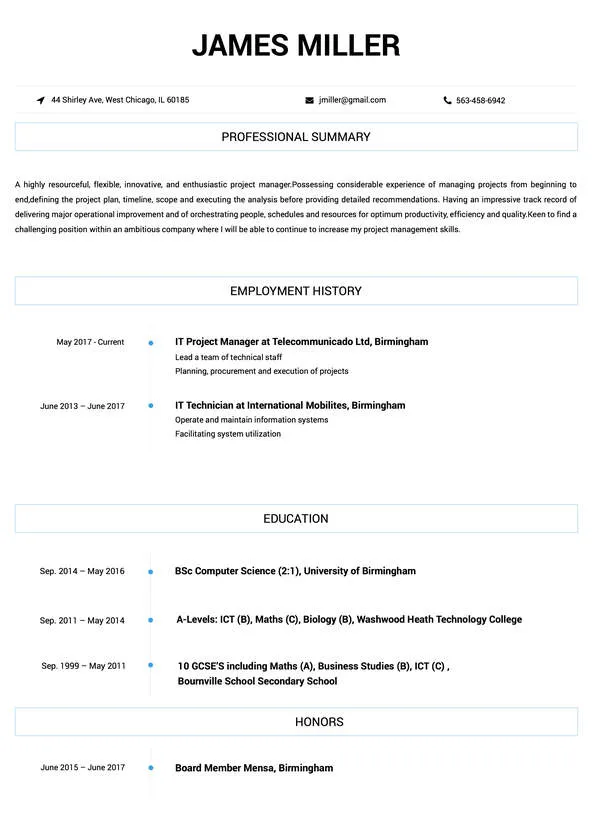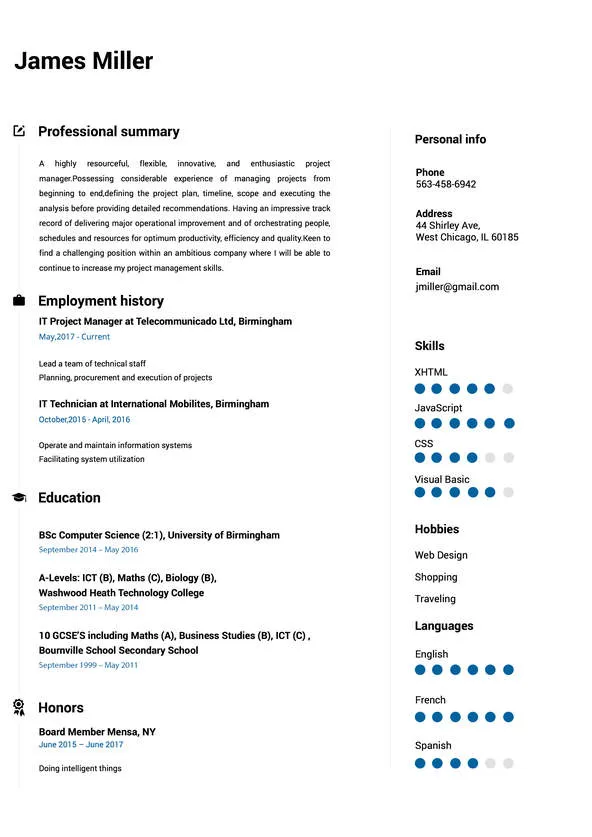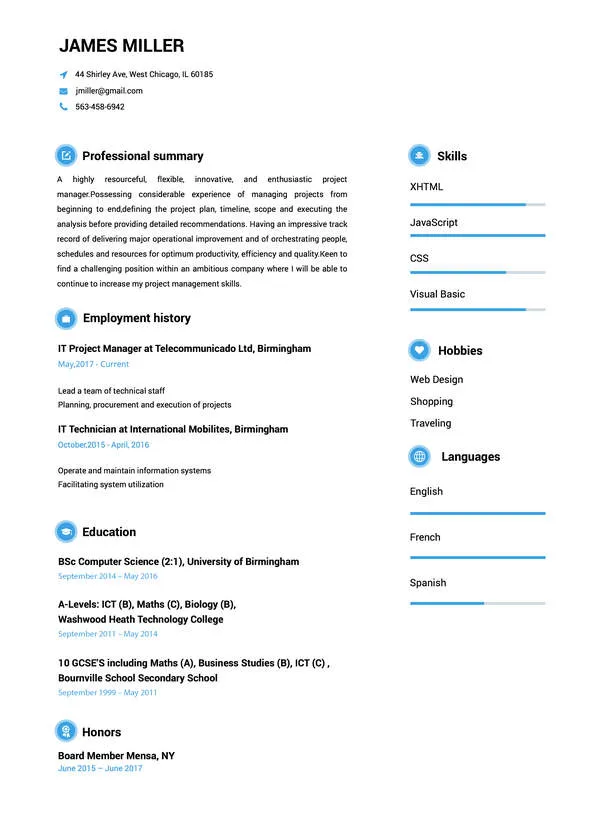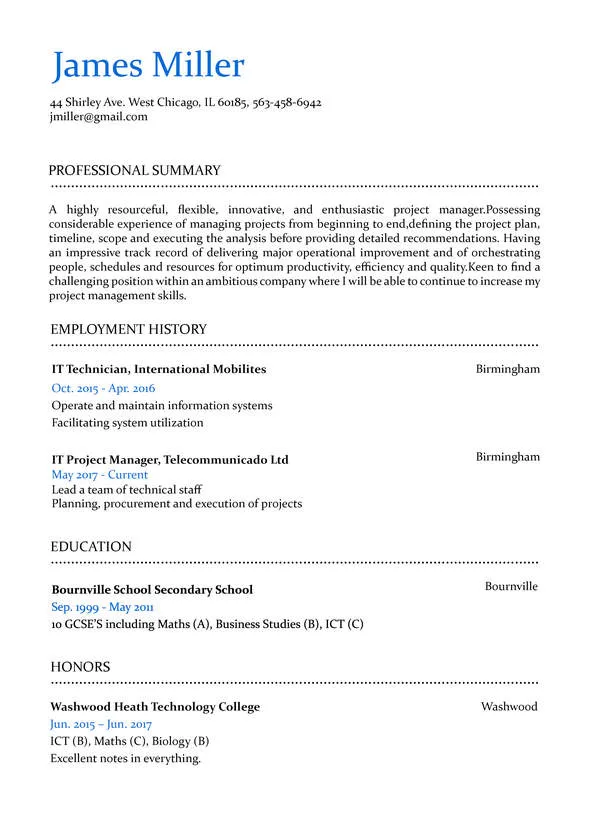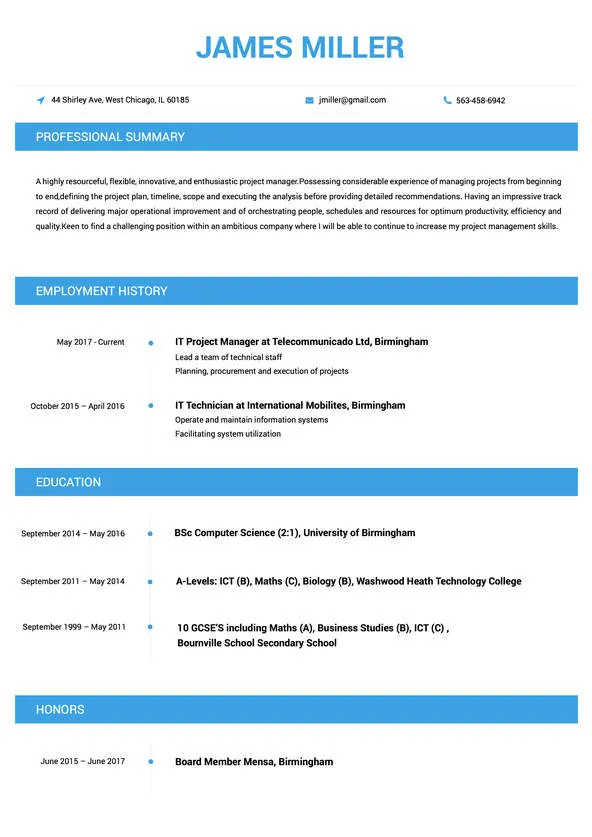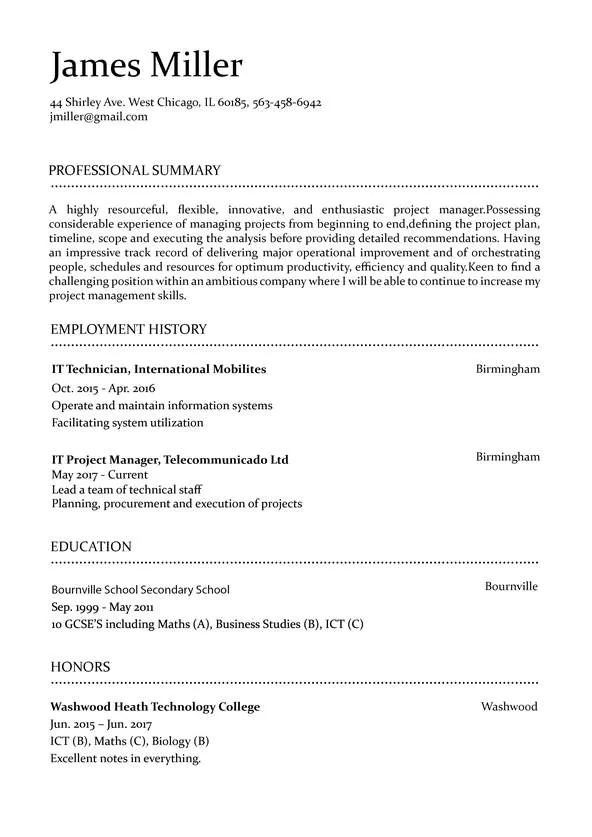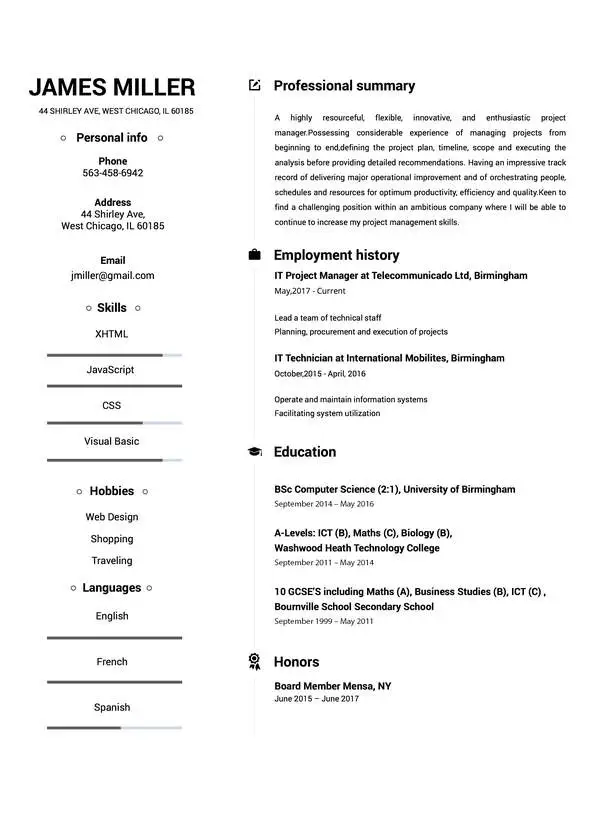 Use This Template
Use This Template
Build your resume in 15 minutes
Create an awesome resume that meets the expectations of potential employers with our selection of professional, field-tested resume templates.
electrical engineer: Resume Samples & Writing Guide
Employment history
- Designing electrical systems and components to meet specifications and requirements
- Developing, testing, and evaluating electrical systems and components
- Evaluating and selecting electrical components and equipment
- Participating in project planning and budgeting
- Developing electrical schematics and diagrams
- Analyzing data and making recommendations
- Providing technical support and guidance to other team members
- Evaluating and selecting electrical components and equipment
- Ensuring compliance with safety regulations and industry standards
Education
Skills
Do you already have a resume? Use our PDF converter and edit your resume.
Professional Summary
Employment history
- Creating and maintaining detailed documentation of all electrical systems
- Participating in project planning and budgeting
- Developing, testing, and evaluating electrical systems and components
- Analyzing data and making recommendations
- Creating and maintaining detailed documentation of all electrical systems
- Participating in project planning and budgeting
- Researching and developing new technologies and processes
- Developing electrical schematics and diagrams
- Ensuring compliance with safety regulations and industry standards
Education
Skills
Professional Summary
Employment history
- Researching and developing new technologies and processes
- Developing electrical schematics and diagrams
- Ensuring compliance with safety regulations and industry standards
- Developing electrical schematics and diagrams
- Providing technical support and guidance to other team members
- Developing, testing, and evaluating electrical systems and components
- Providing technical support and guidance to other team members
- Developing electrical schematics and diagrams
- Analyzing data and making recommendations
Education
Skills
Professional Summary
Employment history
- Ensuring compliance with safety regulations and industry standards
- Participating in project planning and budgeting
- Developing, testing, and evaluating electrical systems and components
- Developing electrical schematics and diagrams
- Troubleshooting and resolving electrical issues
- Ensuring compliance with safety regulations and industry standards
- Analyzing data and making recommendations
- Developing, testing, and evaluating electrical systems and components
- Interfacing with vendors and suppliers to ensure timely delivery of materials
Education
Skills
Employment history
- Monitoring and maintaining electrical systems
- Interfacing with vendors and suppliers to ensure timely delivery of materials
- Developing electrical schematics and diagrams
- Monitoring and maintaining electrical systems
- Providing technical support and guidance to other team members
- Designing electrical systems and components to meet specifications and requirements
- Working with other engineers and technicians to ensure successful completion of projects
- Creating and maintaining detailed documentation of all electrical systems
- Evaluating and selecting electrical components and equipment
Education
Skills
Not in love with this template? Browse our full library of resume templates
Getting hired as an electrical engineer may seem straightforward, you either have the education and credentials or you don’t. But getting the job you want requires demonstrating you have the kinds of skills that make a truly excellent electrical engineer. You need to be able to not just design complex systems, but help communicate those ideas.
What you need to remember is that a resume, even an electrical engineer resume, is all about communication. Engineers are not exactly known for their communication skills, so this is your chance to stand out from the competition by designing the perfect electrical engineer resume. Luckily for you, you’ve already found a complete guide to show you how.
What this guide will show you
- Electrical engineer resume template examples to get you inspired
- How to navigate ATS
- What you can do to appeal to a hiring manager or recruiter
- The proper format for an electrical engineer resume
- The ideal length for your resume
- Which sections you should consider including
- The best licenses and certifications to have and how to include them
- How to include skills on your resume
- The best hard and soft skills for an electrical engineer
- How to highlight your achievements for maximum impact
- How to decide whether to include an objective or summary and how to write either
- How to write an electrical engineer resume when you have little or no experience
- How using a resume builder can help you succeed
Electrical engineer resume template examples
Imagine being asked to design the electrical system of a sportscar without having ever seen one. Needless to say it would be difficult. A good electrical engineer knows that studying existing designs and the principles they’re based on is the basis for quality work. Creating your resume isn’t any different.
Before you start filling in your information, it’s smart to look at quality electrical engineer resume examples to get a feel for what works and what doesn’t. That’s why we’ve put together these examples to get you started. Have a look at them and begin taking notes about which elements you’d like to incorporate into your resume.
[Examples]
How to write a job-winning electrical engineer resume
Any electrical engineering project begins with a brief. You need to know what the requirements are before you begin designing. A resume works the same way. Creating a generic resume without any thought for the specific role it’s intended to apply for is like building an electrical grid for a town without knowing its climate, number of residents, industry, etc. True there are similarities across all such grids but the devil is in the details.
All that is to say, before you begin writing, you need to carefully study the job ad and think about who your resume is for. Treat it like fulfilling a brief. After all, that’s one of the key skills you’ll be demonstrating with your resume!
Who is your resume actually for?
While you may be tempted to begin by considering the job requirements, we recommend starting with the “clients.” It’s rare that resume writers consider who, or what, will actually look at their resume. Understanding the answer to this question is a key to success, so let’s begin there.
Your first audience is actually an algorithm
In most cases, the first hurdle your resume will need to overcome will actually be an algorithm. This is because most large employers use Applicant Tracking Systems (ATS) to pre-scan incoming resumes. These tools use artificial intelligence to look through huge numbers of resumes quickly to establish whether you have the skills, experience, and qualifications they need.
All that sounds fine until you learn that ATS are full of errors and as many as 75% of resumes get rejected for all kinds of reasons. This is because there are dozens of different ATS companies out there, each with a slightly different product. Fortunately, there are some simple rules to follow that should ensure you can get through any of them. Let’s go over what these reasons are and what you need to do to ensure your resume makes it to a human recruiter:
- Submit your resume in the right file type. This one is easy, simply make sure the resume you send in is a .pdf, .doc, or .docx. Don’t be tempted to think “Oh, wouldn’t it be clever if I created my resume in AutoCAD?” or something similar. In a world dominated by ATS, you need to stick to a standard format.
- Use a resume builder to ensure your file is easily read by ATS. Not all .pdfs are created equal. The way the data in the file is structured can have a huge impact on whether an ATS is able to accurately read it. That’s why your safest bet is using a resume builder specifically designed to create ATS-friendly files.
- Use keywords well. Maybe you’ve heard of how websites carefully use keywords to rank in Google. ATS scan resumes in a similar way to how Google would scan a website. That’s why you should use similar keyword optimization techniques. This involves studying the job ad and taking the requirements it lists and trying to include as many of them in your resume as possible. Phrasing your skills, experience, etc. using the same phrases you found in the job ad well helps ensure the ATS connects the two.
With these 3 techniques you’ll have a significant leg up on the competition who are far more likely to make a basic mistake that gets their resume automatically rejected by ATS.
How you can appeal to recruiters
Once you make it past ATS you still need to convince a recruiter that you’re the right electrical engineer for the job. The trick here is understanding their perspective and goals. In a perfect world they would simply hire the best engineer, but human psychology is much more complicated. Fortunately, you can use that to your advantage.
Besides having the right skills, experience, etc. you increase your chances of getting the job by making it as easy as possible for the recruiter to choose you. Make yourself the path of least resistance. But how can you do this?
That recruiter has their own brief for a candidate. They’ve got a set of criteria that they need to be able to fulfill in order to hire someone. Fortunately, you’ve almost got access to those criteria in the form of the job ad. Analyze it closely and list all of the skills, experience, ect. you think the job requires. Then try and ensure your resume clearly shows you have as much of it as possible. This will make it easy for a recruiter to look at your resume and say “yes.”
Besides that, the other main thing you can do to appeal to recruiters as an electrical engineer is write well. There’s no getting around the fact that engineers are not known for their writing, so you can bet that recruiter is reading through a lot of poorly written resumes. So put some time and effort into your resume’s writing. Get a friend to help or even pay a professional to get it just right. An exceptionally well written electrical engineer resume is sure to stand out from the competition.
How should you format your electrical engineer resume?
You know you can’t start designing or building the components of an electrical system until you’ve worked out its overall structure. The same approach is ideal for your resume. Start by deciding which sections you want to include and how long it should be.
As you make these decisions though, there’s one rule to follow: more important information goes at the top. Remember that your goal is to make the recruiter’s job as easy as possible and that requires getting them the most critical information about you quickly. So, keep this in mind when arranging your sections and use reverse chronological order when listing your work experience.
How long should your resume be?
If you’re looking for your first electrical engineering position or only have a few years of experience, the answer is: one page. If you have more experience and useful information to include, you can go up to two pages. The thing to keep in mind is that a recruiter doesn’t want to spend more time than necessary reviewing your resume, so try and make it as concise and short as possible while still providing valuable information about you as a candidate.
If you need help, this is an excellent time to bring in a friend. If they’re a fellow electrical engineer, they can help you with wording your achievements in the field. But even if they’re not, they can help you go through and ask “do you need to include this?” or “is there a way to say this in fewer words or more clearly?” This kind of help will make it far easier to get your resume more readable and manageable.
What are the most important sections to include?
- Resume objective or summary
- Work experience
- Licenses and Certifications
- Achievements
- Projects
- Education
- Hard skills
- Soft Skills
How to list licenses and certifications as an electrical engineer
The biggest initial piece of information you need to get across is whether you’re licensed. You need to make it clear upfront whether you’ve passed the Fundamentals of Engineering (FE) or Professional Engineer (PE) exams. That’s why you should put EIT (Engineer in Training) or PE (Professional Engineer) after your name so it’s immediately clear. If you’re actively pursuing one of these licenses, you can mention this in an objective or summary (more on that below).
Beyond the basic licenses, adding certifications can show that you have special knowledge and have gone above and beyond to expand your skills. Having a certificate acronym next to your name adds professionalism and communicates that professionalism efficiently.
But how should you show off those certifications? Simply start with the certification followed by the organization which granted it and the year you obtained it.
Certified Energy Manager (CEM), The Association of Energy Engineers®, 2017
Licenses and certifications to consider including
- Energy Efficiency Management Certificate
- Key Accounts Certificate
- IPC-A-600 Acceptability of Printed Circuit Boards Certification
- Associate Systems Engineering Professional (ASEP) (various certification levels)
- Electronics in Traffic Signal Technician Certification
- iNARTE Electrostatic Discharge Control (ESD) Certification
- Certified Energy Manager (CEM)
- Certified Lighting Efficiency Professional (CLEP)
- Certified Power Quality Professional (CPQ)
- Certified Sustainable Development Professional (CSDP)
- Distributed Generation Certified Professional (DGCP)
How to include your skills
Listing the right skills (and listing them correctly) is critical to both get past ATS and appeal to recruiters. Choosing the right skills comes down to carefully analyzing the job ad. Then, remember to list those skills the same way they’re listed in that ad.
But beyond choosing the right skills to include, it also comes down to how you show that you really have those skills. A simple list is great, but you’ll want to give examples of instances when you concretely demonstrated that you possess those skills (especially for soft skills, which are harder to prove). This can be down in a skills section, an achievements section, or in your work experience. Let’s look at some examples to see why this is effective:
Excellent presentation skills
There’s nothing inherently wrong with listing a skill like this, but you can do better.
Excellent presentation skills, presented my work on advanced RFID systems and subsequently presented my findings at 2 conferences and 3 other universities.
In this case, the reader can clearly see that you have extensive experience presenting your ideas and work. This description gives much more confidence in your presentation skills than the first example.
The best soft skills to include on an electrical engineer resume
- Presentation skills
- Communication
- Problem solving
- Working well in teams
- Attention to detail
- Self-motivated
- Emotional intelligence
- Conflict resolution
- Adaptability
- Patience
The best hard skills to include on an electrical engineer resume
- PLC
- EIT
- Linux
- Circuit designing
- Microcnotrollers
- Schematic entry
- Auto CAD
- NFPA Standards
- Linear systems theory
- Preparing and executing operational plans
Just bear in mind the precise skills you’ll want to emphasize will vary tremendously depending on which type of electrical engineering position you’re applying for, so always use the job ad as your guide.
How to highlight your most important achievements
Whether something you achieved on a job or perhaps something you did in your free time, showing off your achievements is an excellent way to reinforce your skills and make a strong impression on a recruiter.
In particular, electrical engineers are expected to show their work and prove their conclusions. Being vague about your conclusions or designs simply isn’t going to cut it. Because your resume should work to demonstrate all the qualities expected in you as an employee, you need to be specific about your achievements.
The same rules that you used for your skills apply here: be specific and connect your achievements with the electrical engineering position you’re applying for. This could also be a great place to show some personality and make yourself more memorable.
Rebuilt the electrical system of a Ford Mustang GT 5.0.
An achievement like this shows that you’re a talented electrical engineer, capable of complex problem solving, while also making you sound like an interesting person to work with.
How to write about your work experience
One error many people make when listing their work experience is focusing too much on responsibilities. Listing responsibilities doesn’t tell a recruiter anything about what you are capable of or even whether you met the expectations for those responsibilities. For example, you could write:
Responsible for ensuring electrical system safety requirements were met.
If you were the person in charge of safety at Chernobyl you could write on your resume that you were “responsible for safety” and be telling the truth. In other words, the responsible party isn’t what recruiters are concerned with. They want to know what the results of your work were.
Ensured that all 4 generators met safety guidelines resulting in no workplace accidents involving electrical systems in 5 years.
This example really shows that you did your job and got results. This kind of writing will make a far stronger impression.
Why your resume should start with an objective or summary
You only get one first impression with your resume, so you need to control it and make it count. The best way to do that is with an objective or summary. Both are ways to quickly get the most important information about you as a candidate across and to give important context for the rest of your resume.
The difference is mostly in length. A resume objective will usually be a simple sentence explaining who you are and what you aim to achieve with your resume. A summary by contrast can be a few sentences long and use the extra space to explain something like a gap in your work history or your motivation for applying to a position. Now let’s see what each should look like.
How to write an electrical engineer objective
The idea here is to cram as much valuable information as possible into a short, but well written, sentence.
I’m an experienced and qualified electrical engineer looking for a new job.
Remember, the worst thing you can do with your resume is waste a recruiter’s time and this resume objective does just that. “Experienced” and “qualified” are too vague to mean anything to a recruiter and the fact that you’re looking for a new job is already obvious. Let’s see a better version:
EIT with background in large electric motor design looking to expand skill set at Elettra Technology Inc.
This example gives the reader a lot of crucial information quickly. Right away they know you’re an EIT, what your specialty is, and that you wrote this resume specifically for their company (meaning you took the time to do it right).
How to write an electrical engineer summary
The key thing to keep in mind here is that just because a resume summary can be longer, doesn't mean it should be. You still need to be economical in your language.
I recently finished one year of physical therapy and recovery after my car was T-boned by a drunk driver. I now feel it’s time to return to the workforce. I believe my previous experience working in magnetic resonance engineering is still highly relevant and I would be a great addition to your team. Thank you for your consideration.
This example shows you exactly how a poorly written resume summary can make a bad first impression. First, it’s written in the first person and resumes are generally written in the third person. But more than that, it wastes precious space going into details about a car accident, which could be interpreted as either fishing for sympathy or simply bad social skills (not knowing when to talk about something). It then takes more space to do things like “thank you for your consideration,” which is polite, but not really necessary. Let’s see a better version now:
PE specialized in magnetic resonance engineering looking to join the team at GE Healthcare after taking 1 year off to recover from a car accident. Passionate about MRI development after the technology helped save my life and particularly interested in GE Healthcare’s latest advancements in the SIGNA™ line.
This version switches up the gap in your work history due to an injury and emphasizes a passionate interest in a specific subfield of electrical engineering. This shows genuine motivation and being specific about a line of MRI machines gives a feeling that you are already familiar with the company as well as its products. Together, these make for a much stronger resume summary.
How to write an electrical engineer resume when you have little or no experience
If you’re applying for an internship or an entry level position as an EIT, showing you’ve got relevant skills and achievements is harder. This is when it’s important to remember that while companies can teach you plenty of the skills you’ll need, teaching the attitude needed to be a successful electrical engineer is much more difficult. So, in these cases it can make sense to emphasize relevant soft skills like attention to detail or problem solving.
In addition, obtaining certifications can show that you’re self-motivated enough to be trusted despite having less experience. Even if you’re in the process of obtaining a certification, mentioning it can be helpful. Just be sure to be honest about your experience and resist the urge to lie or bend the truth. Getting hired for a position you’re not ready for is not going to help your career in the long-run.
How to make your resume stand out: customize
While all of the advice presented here can help your resume stand out, if there’s one overriding piece of advice we would emphasize it’s customization.
While we’ve hinted at this above, it’s worth pointing out that few things will make a stronger impression on a recruiter than a resume which has clearly been written for this exact position. Mentioning the company name and position shows a recruiter that you took the time instead of simply sending off dozens of identical resumes to every job position you could find.
For electrical engineers, considering you’ll be expected to take the time to really get things right and focus on details, this leaves a strong impression.
Why a resume builder is an essential tool
You wouldn’t start designing a circuit board with 90s tech, so why would you create a resume the same way they did decades ago? Now, you can skip all of the frustrating formatting and design issues that come with building a resume in a word processor. These days, to stand out, you need great design and to reach a recruiter you need an ATS-friendly file. Fortunately, modern resume builders provide both and more.
With Resumebuild.com’s powerful resume creation tool you can feel confident that you’re ready for any ATS or recruiter. With plenty of expertly-curated examples to get you started and clean, modern designs to work with, you can easily create a resume that stands out without distracting from the content.
electrical engineer Job Descriptions; Explained
If you're applying for an electrical engineer position, it's important to tailor your resume to the specific job requirements in order to differentiate yourself from other candidates. Including accurate and relevant information that directly aligns with the job description can greatly increase your chances of securing an interview with potential employers.
When crafting your resume, be sure to use action verbs and a clear, concise format to highlight your relevant skills and experience. Remember, the job description is your first opportunity to make an impression on recruiters, so pay close attention to the details and make sure you're presenting yourself in the best possible light.
electrical engineer
- Apply E&I permit and prepare Job Safety Analysis (JSA) and conduct a tool-box meeting.
- Work closely with contractors for PTW and LOTO and Prepare Job safety analysis and Task Risk Assessment
- prepare procedures for Preventive Maintenance Works in ExxonMobil
- Maintenance Troubleshooting of Sub-station Breakers and Switch Gears,
- Maintenance & Troubleshooting and perform preventive maintenance & Testing and Commissioning of HV/LV Motors and Motor Operated Valves and Variable Frequency Drives & MM2 &UPS& Fire & Gas alarm panel and its associated equipment’s. Plant lighting.
- Attend shutdown projects and completed it within the target period. Supervise the planning of all Electrical / Instrument Maintenance activities, as per schedule
- coordination with the Plant Manager to ensure smooth execution of MOC projects
electrical engineer
- Perform preventive maintenance works of partial discharge test & tangent – delta test for 11 KV/6.6 KV/3.3 KV Motors and send to the vendor for analysis in ExxonMobil
- Maintenance & troubleshooting perform preventive maintenance of generators and transformers.
- Perform preventive maintenance works& Troubleshooting of heat-tracing panels and lighting panels and its associated circuits.
- Follows-up and gives work direction to the electrical team.
electrical engineer
- Commissioning & Preventive Maintenance of Gas Generators Rated 380KVA
- Make Cummins with its ACB Panels.
- Commissioning of Synchronous Panel with Woodward Technology.
- Commissioning of Chillers Make Kriloskar 75TR with VFD Drive.
- Laying out all grounding and Earthing systems along with the proper Illumination.
- system according to the SLD.Selection of Proper Schedules of cables and Designing for safe and protective.
- operations according to Oil & Gas Regulations.
electrical engineer
- Prepared daily power report and send to planing head,electrical head and engineering head.
- make purchase requisition of spare parts through SAP and fallow up the material procurement process.
- Responsible for shift activities and maximum power generation through 6.25 MW Power plant.
- Train workers in safety procedures such as the use of fall protection devices, proper use of first aid kit, and fire fighting training.
electrical engineer
- Operation and preventive maintenance of DG set of 75 KVA, 125KVA, 180KVA (Of kirloskar, Cummins & Ashok Leyand make)
- Operation and preventive maintenance of AC
- Operation and maintenance of DG.
- Operation of change over switches.
- Operations and maintenance of all type of AC (split, duct able)
- Ability to work in a team and get best from the team.
- Hank dyeing machine, Paddle Dyeing & Tumbler dryer, Hydro, Hank & cone Winder.
electrical engineer Job Skills
For an electrical engineer position, your job skills are a key factor in demonstrating your value to the company and showing recruiters that you're the ight fit for the role. It's important to be specific when highlighting your skills and ensure that they are directly aligned with the job requirements, as this can greatly improve your chances of being hired. By showcasing your relevant skills and experience, you can make a compelling case for why you're the best candidate for the job.
How to include technical skills in your resume:
Technical skills are a set of specialized abilities and knowledge required to perform a particular job
effectively. Some examples of technical skills are data analysis, project management, software proficiency,
and programming languages, to name a few.
Add the technical skills that will get hired in your career
field with our simple-to-use resume builder. Select your desired resume template, once you reach the skills
section of the builder, manually write in the skill or simply click on "Add more skills". This will
automatically generate the best skills for your career field, choose your skill level, and hit "Save &
Next."
- Power Systems
- Circuit Design
- Electrical Design
- Electronics
- Wiring
- Programming
- Microcontrollers
- PLC Programming
- Automation
- Testing
- Troubleshooting
- Soldering
- Cabling
- Simulation
- CAD/CAM
- PCB Design
- Control Systems
- Instrumentation
- Machinery Maintenance
- Electrical Safety
- Signal Processing
How to include soft skills in your resume:
Soft skills are non-technical skills that relate to how you work and that can be used in any job. Including
soft skills such as time management, creative thinking, teamwork, and conflict resolution demonstrate your
problem-solving abilities and show that you navigate challenges and changes in the workplace
efficiently.
Add competitive soft skills to make your resume stand-out to recruiters! Simply select
your preferred resume template in the skills section, enter the skills manually or use the "Add more skills"
option. Our resume builder will generate the most relevant soft skills for your career path. Choose your
proficiency level for each skill, and then click "Save & Next" to proceed to the next section.
- Communication
- Interpersonal
- Leadership
- Time Management
- Problem Solving
- Decision Making
- Critical Thinking
- Creativity
- Adaptability
- Teamwork
- Organization
- Planning
- Public Speaking
- Negotiation
- Conflict Resolution
- Research
- Analytical
- Attention to Detail
- Self-Motivation
- Stress Management
- Collaboration
- Coaching
- Mentoring
- Listening
- Networking
- Strategic Thinking
- Negotiation
- Emotional Intelligence
- Adaptability
- Flexibility
- Reliability
- Professionalism
- Computer Literacy
- Technical
- Data Analysis
- Project Management
- Customer Service
- Presentation
- Written Communication
- Social Media
- Troubleshooting
- Quality Assurance
- Collaboration
- Supervisory
- Risk Management
- Database Management
- Training
- Innovation
- Documentation
- Accounting
- Financial Management
- Visualization
- Reporting
- Business Acumen
- Process Improvement
- Documentation
- Relationship Management.
How to Improve Your electrical engineer Resume
Navigating resume pitfalls can mean the difference between landing an interview or not. Missing job descriptions or unexplained work history gaps can cause recruiters to hesitate. Let's not even talk about the impact of bad grammar, and forgetting your contact info could leave your potential employer hanging. Aim to be comprehensive, concise, and accurate.
Employment history
- Providing technical support and guidance to other team members
- Analyzing data and making recommendations
- Performing calculations to determine system performance and safety
- Interfacing with vendors and suppliers to ensure timely delivery of materials
- Evaluating and selecting electrical components and equipment
- Creating and maintaining detailed documentation of all electrical systems
Education
Skills
Unexplained Year Gaps and Missing Job Experiences are a No-no
Gaps in your resume can prevent recruiters from hiring you if you don't explain them.
Key Insights- It's okay to have gaps in your work experience but always offer a valid explanation instead of just hiding it.
- Use the gap to talk about positive attributes or additional skills you've learned.
- Be honest and straightforward about the gap and explain it using a professional summary.
How to Optimize Your electrical engineer Resume
Keep an eye out for these resume traps. Neglecting to detail your job roles or explain gaps in your career can lead to unnecessary doubts. Grammar blunders can reflect negatively on you, and without contact information, how can employers reach you? Be meticulous and complete.
Professional Summary
Employment history
- Creating and maintaning detaled documentaion of all electicall systems
- Trouble-shootin' and resolvin' electrical issus.
- Proving technicle support an guidance too other team memebers.
- Interfacing with vendors'n suppliers to ensuer timely delivery of materials.
- Reserching and developin new technologys and proceses.
- Designing electrical systems an components too meet specifications an requirements.
- Creating and maintainin detaled documentation of all electrical systems.
- Performin calcuations too determin system performance an saftey.
- Analysing data and makin recomendations.
Education
Skills
Avoid Spelling Mistakes and Include your Contact Information
Missing contact information prevents recruiters from understanding you're the best fit for the position.
Key Insights- Make sure you're not missing contact information on your resume. That should include your full name, telephone number and email address.
- Make sure to use a professional email address as part of your contact information.
- Highlight your contact information and double check that everything is accurate to help recruiters get in touch with you.
electrical engineer Cover Letter Example
A cover letter can be a valuable addition to your job application when applying for an electrical engineer position. Cover letters provide a concise summary of your qualifications, skills, and experience, also it also gives you an opportunity to explain why you're the best fit for the job. Crafting a cover letter that showcases your relevant experience and enthusiasm for the Accounts Payable role can significantly improve your chances of securing an interview.
Microsoft
Redmond, Washington
To the Recruitment Team at Microsoft
I am a passionate Electrical Engineer with 8 years of experience in Engineering. I am excited to submit my application for the Senior Electrical Engineer position at Microsoft, where I believe my skills and expertise would be a great asset to your team.
Growing up, I always had a fascination with Research and Development. As I pursued my education and gained experience in this field, I realized that this was where I could make the most impact. I have had the opportunity to work on things throughout my career like personal projects and voluntary work, which have developed in me a deep understanding of the challenges and opportunities in this field. I am excited to bring my passion and expertise to the role at and help your organization achieve its goals.
Thank you for considering my application for the Senior Electrical Engineer role. I am looking forward to a future where we work together to drive this organization's success.
Cordially,
Jake Austin
876-158-5332
[email protected]
Jake Austin
Showcase your most significant accomplishments and qualifications with this cover
letter.
Personalize this cover letter in just few minutes with our user-friendly tool!
Related Resumes & Cover Letters

Build your Resume in 15 minutes
Create an awesome resume that meets the expectations of potential employers with our selection of professional, field-tested resume templates.

